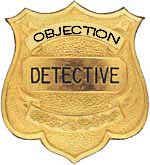
Why do some salespeople hate objections? My guess is that they feel it disrupts the flow of their sales pitch. Or perhaps they believe that the objection signals to them that they have lost the sale. Neither of these are true. An objection should never be considered a disruption or a loss. Objections are simply the customers way of asking for more information.
So, I recommend that instead of doing your best to avoid objections you become an "Objection Detective." Make it your job to unearth every objection that the customer has. Have a "bring it on" attitude to objections. Because they are not the END of the sale they are the BEGINNING of the opportunity to understand your customer better and provide them with what they need to make an informed purchase.
Many salespeople think it is best to leave the objection buried. Perhaps if they ignore it it will go away. But, when you do that, it eventually will come back to haunt you. Like any infection left untreated, it will only grow and grow. Your job is to surface it, clean it and move on in the sales process. Unanswered objections lead to lost sales or the need to lower the price to keep the sale.
So, how do you go about becoming an Objection Detective? You have to listen very carefully to what the customer is telling you. Sure you need to hear the words they are saying, but it is even more important to hear what they are not saying. Customers talk to us in all sorts of ways. Their body language, facial expressions and tone of voice often provide more information than their words. Watch for the sometimes subtle (and not so subtle) changes in a customers demeanor and then ask the questions that will uncover the issue. If you see that your customer stops making eye contact or starts fidgeting or looking at his watch, it is time to slow down or back up and find out the source of their discomfort. Even a slight change can signify a serious underlying objection.
The more objections you uncover and answer, the easier the close will be. And you want an easy close don't you?
In future blogs, we will discuss the types of objections and the best way to answer them. Until then, try becoming an objection detective and see what results you get. I would love to hear from you.




